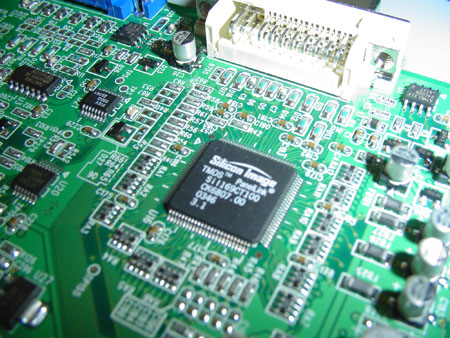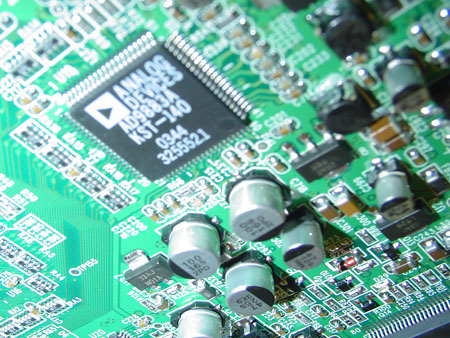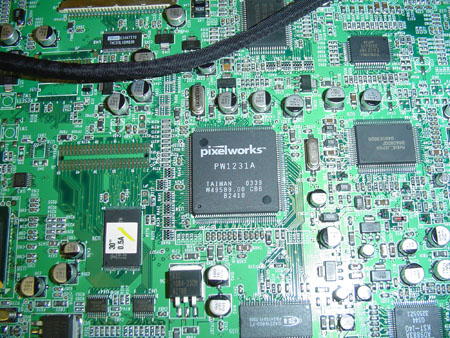Syntax Olevia 30" LCD: Cheap, Robust and Exceptional
by Kristopher Kubicki on June 30, 2004 12:00 AM EST- Posted in
- Displays
Signal Processors
Recall the almighty signal processor that we talked about during our Albatron LWX-30AMS review? Unfortunately, the Albatron LCD TV used an obscure, under-powered signal chipset as a transitional chip before adopting a much more capable PixelWorks processor. Syntax looks as if they got it right on the first try, going with the PW181 DSP. PixelWorks' website has more information on the chip. Essentially, the PW181 acts as the CPU for the LCD, pulling the functions of the other chipsets on the LCD into one signal relayed directly into the panel.Below, you can catch a glimpse at Silicon Image's HDCP receiver. Obviously, the processor is not capable of 1080p, but 720p and 1080i are fully supported.
And below is the analog counterpart of the HDCP receiver from Analog Devices.
Pulldown, interlacing, and Macrovision are all processed on this chip below. In the bottom left corner of the image, you can also see Fujitsu's logo on an IC.
For the most part, the remainder of the ICs on the board control analog TV switching, cable TV processing, and audio processing. There is not a dedicated audio DSP like the SRS-WOW found on the Albatron LWX-30AMS.














21 Comments
View All Comments
Swaid - Thursday, July 1, 2004 - link
K, got it...what I found from Digital Display Work Group (www.ddwg.org)
Dual Link
Dual Link DVI supports 2x165 MHz (2048x1536 at 60 Hz, 1920x1080 at 85 Hz). A dual link implementation utilizes all 24 of the available pins.
Single Link
Single Link DVI supports a maximum bandwidth of 165 MHz (1920x1080 at 60 Hz, 1280x1024 at 85Hz). A single link implementation utilizes 12 of the 24 available pins.
Souka - Thursday, July 1, 2004 - link
1280x768 native? Too low rez...my 19" is at that rez.TallCoolOne - Thursday, July 1, 2004 - link
Apple Dual-Link version of the nVidia 6800 is also exclusive to the PowerMac G5, so there's another $2000 or so needed to run the Apple 30"....I'm sure this technology will come to the PC _very_ soon, and will also require serious video card muscle to run at such high resolutions. For that reason, I don't see the same requirement on a Mac as a fair basis of criticism.
PrinceGaz - Thursday, July 1, 2004 - link
#14- the Apple display requires a Dual-Link DVI connection because Single-Link DVI isn't capable of a 2560x1600 resolution.Single-Link DVI only has 165MHz bandwidth which means a maximum resolution of 1920x1080 or 1600x1280 at a refresh-rate of 60hz. By using Dual-Link you get double the bandwidth which allows for double the resolution -- 2560x1600 is exactly double 1600x1280.
Neekotin - Thursday, July 1, 2004 - link
hey kris, is it really that good? ive been shopping for the dell 20' lately and now this.. your making my headache..Swaid - Thursday, July 1, 2004 - link
#15Awsome!
KristopherKubicki - Thursday, July 1, 2004 - link
Working on the Apple LCD and the Philips 1920x1080 LCD also.Kristopher
Swaid - Wednesday, June 30, 2004 - link
Has anyone seen reviews of the 30" Apple LCD display yet? The claimed 16ms response times sound very interesting for a 30" LCD...Actually it sounds like its 2 LCD panels put together since it needs a card capable of dual DVI output... Interesting!
Anandtech needs to review this ASAP! :D
WileCoyote - Wednesday, June 30, 2004 - link
Wow, it's a LCD review and the manufacturer isn't Samsung! Remember this moment, they don't come very often at Anandtech.Dagar - Wednesday, June 30, 2004 - link
Does the TV supply EDID to the PC via DVI?